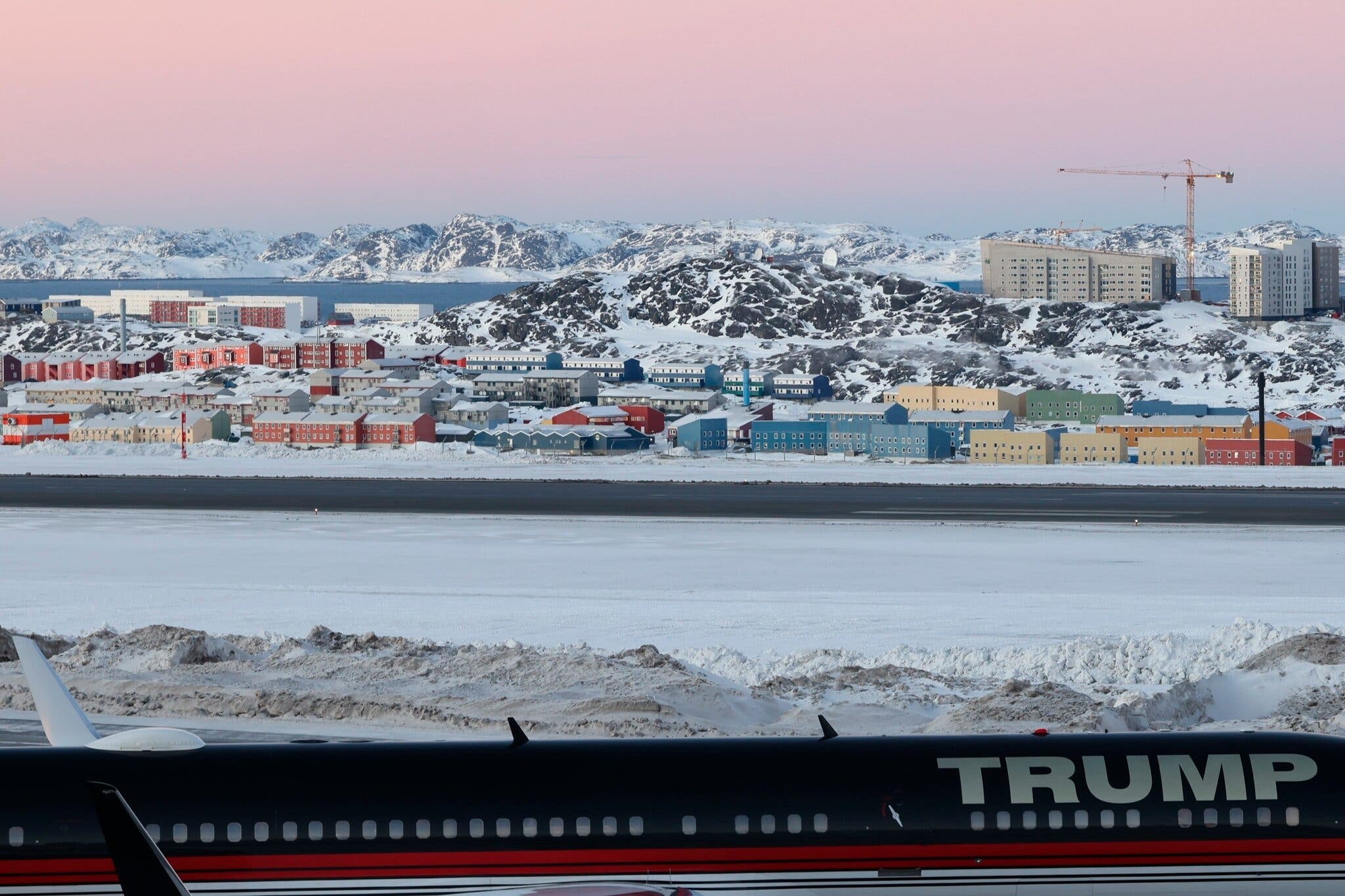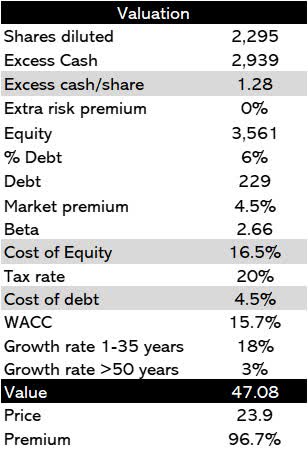Greenland And Denmark: Trump's Influence And Shifting Geopolitics

Table of Contents
Trump's Greenland Gambit: A Geopolitical Earthquake
The Failed Purchase Attempt and its Fallout
Trump's surprising proposal to buy Greenland in August 2019 was met with widespread astonishment and swift rejection. The suggestion, floated during a meeting with aides, was met with immediate and firm pushback from both the Danish government and the Greenlandic government. The proposal was seen as a blatant disregard for Greenlandic self-determination and a clumsy attempt to assert US influence in the Arctic. The international reaction ranged from bemusement to outright condemnation, highlighting the insensitivity of the proposal and raising questions about US foreign policy strategies.
- Public statements from Trump: Trump's public comments on the matter were characterized by a lack of diplomatic nuance and a focus on perceived US economic and strategic benefits.
- Danish government response: The Danish government, through Prime Minister Mette Frederiksen, firmly rejected the proposal, stating that Greenland was not for sale. This response underscored Denmark's commitment to Greenland's self-determination.
- Greenlandic self-determination: The Greenlandic government, while acknowledging the strategic importance of its land, also unequivocally rejected the proposal, highlighting the importance of Greenlandic sovereignty and autonomy.
Underlying Motivations and Strategic Interests
The attempted purchase wasn't merely a whimsical idea; it stemmed from deeper strategic US interests. Greenland possesses significant untapped natural resources, including rare earth elements crucial for modern technology and mineral deposits vital for various industries. The US also views Greenland's strategic location in the Arctic as vital for national security, given increasing geopolitical competition in the region, including the potential for increased military activity and resource extraction by other global powers.
- Military bases: The US already has a military base in Greenland (Thule Air Base), and the purchase attempt could have paved the way for expansion and further military presence.
- Resource control: Access to Greenland's mineral and rare earth element resources is a key driver of US interest, reducing dependence on other countries for these vital materials.
- Arctic sovereignty: The Arctic is opening up due to climate change, leading to increased competition for resources and strategic control of shipping lanes. Greenland's location makes it a crucial piece in this competition.
- Climate change: The melting Arctic ice cap presents both opportunities and challenges. The US sought to secure its influence in the changing Arctic landscape.
Greenland's Autonomy and Self-Determination
Navigating the Relationship with Denmark
Greenland holds a unique status as a constituent country within the Kingdom of Denmark, enjoying home rule but ultimately remaining under the Danish crown. The relationship is complex, with Greenland seeking greater economic and political autonomy while still relying on Denmark for certain financial support. This balance is constantly shifting as Greenland asserts its independence and seeks to manage its own affairs, particularly regarding resource management.
- Economic independence: Greenland is actively pursuing economic diversification, moving beyond its historical dependence on fisheries and seeking to develop its mining and tourism sectors.
- Political self-determination: The desire for increased self-governance and control over its resources is a central theme in Greenlandic politics.
- Treaty obligations: Greenland's relationship with Denmark is governed by various treaties and agreements, which influence its autonomy and decision-making.
- Greenlandic identity: A strong Greenlandic national identity is driving the push for greater self-determination and the assertion of its cultural heritage.
Greenland's Resource Management and Development
Greenland's vast natural resources represent both significant economic potential and considerable environmental challenges. Mining operations, particularly for rare earth elements, present opportunities for economic growth but also raise concerns about environmental damage and sustainability. Balancing economic development with environmental protection is a crucial task for the Greenlandic government.
- Mining: The mining sector offers substantial economic opportunities but carries inherent environmental risks. Sustainable mining practices are essential.
- Fisheries: The fishing industry remains a vital part of Greenland's economy, although sustainable management practices are crucial for long-term viability.
- Tourism: Tourism is a growing sector, offering economic benefits while also creating potential environmental pressures.
- Renewable energy: Greenland has vast potential for renewable energy development, particularly hydropower and wind power, reducing reliance on fossil fuels.
- Environmental protection: Balancing economic development with environmental protection is a critical challenge facing Greenland.
Denmark's Response and Shifting Foreign Policy
Maintaining the Relationship with Greenland
Denmark faces the delicate task of balancing its relationship with Greenland with its international relations, particularly with the US. Trump's actions challenged Denmark's long-standing relationship with Greenland and forced a reassessment of its foreign policy in the Arctic. While affirming Greenland's self-determination, Denmark seeks to maintain a strong partnership with its constituent country.
- Diplomatic strategies: Denmark has sought to maintain its close ties with the US while also supporting Greenland's autonomy and self-determination.
- Economic cooperation: Economic cooperation remains a key element of the Denmark-Greenland relationship.
- Arctic Council involvement: Denmark plays an active role in the Arctic Council, advocating for international cooperation and sustainable development in the region.
- Maintaining sovereignty: Denmark remains committed to upholding Greenland’s right to self-determination and sovereignty.
Navigating the Complexities of Arctic Geopolitics
The Arctic is experiencing increased geopolitical activity, creating both opportunities and challenges for Denmark. The melting ice cap is opening up new shipping routes and access to resources, attracting attention from various global powers. Denmark, through its involvement in the Arctic Council and other international forums, seeks to manage this competition and promote cooperation.
- Climate change: Climate change is a major factor shaping the Arctic landscape and its geopolitical implications.
- Resource management: Denmark advocates for sustainable resource management in the Arctic to balance economic development and environmental protection.
- Military presence: The increased military activity in the Arctic requires careful management to prevent escalation and maintain stability.
- International cooperation: International cooperation is crucial to addressing the challenges and opportunities presented by the changing Arctic.
Conclusion
Trump's attempt to purchase Greenland, while ultimately unsuccessful, exposed the complex geopolitical dynamics surrounding the island and its relationship with Denmark. The incident highlighted the growing strategic importance of the Arctic, the increasing competition for resources, and the evolving aspirations of Greenland for greater self-determination. Denmark's response reflects the challenges of balancing historical ties with the need to adapt to a changing geopolitical landscape. Greenland itself stands at a critical juncture, weighing its options for economic development and self-governance in the face of global competition.
Understanding the complexities of the relationship between Greenland and Denmark, especially in the context of Trump's influence and the shifting geopolitical landscape, is crucial. Further research and analysis are needed to fully grasp the long-term implications of these events and to develop strategies for navigating the future of this vital Arctic region. Continue exploring the issues surrounding Greenland and Denmark to stay informed about this important geopolitical dynamic.

Featured Posts
-
 Palantir Stock Is A 40 Increase By 2025 Realistic Investment Analysis
May 09, 2025
Palantir Stock Is A 40 Increase By 2025 Realistic Investment Analysis
May 09, 2025 -
 Ve Day Speech Taiwans Lai On The Rising Threat Of Totalitarianism
May 09, 2025
Ve Day Speech Taiwans Lai On The Rising Threat Of Totalitarianism
May 09, 2025 -
 Emmerdales Amy Walsh Supports Wynne Evans After Strictly Controversy
May 09, 2025
Emmerdales Amy Walsh Supports Wynne Evans After Strictly Controversy
May 09, 2025 -
 Trumps Threats Greenlands Closer Ties With Denmark
May 09, 2025
Trumps Threats Greenlands Closer Ties With Denmark
May 09, 2025 -
 Psgs Winning Season Analyzing Luis Enriques Managerial Influence
May 09, 2025
Psgs Winning Season Analyzing Luis Enriques Managerial Influence
May 09, 2025
